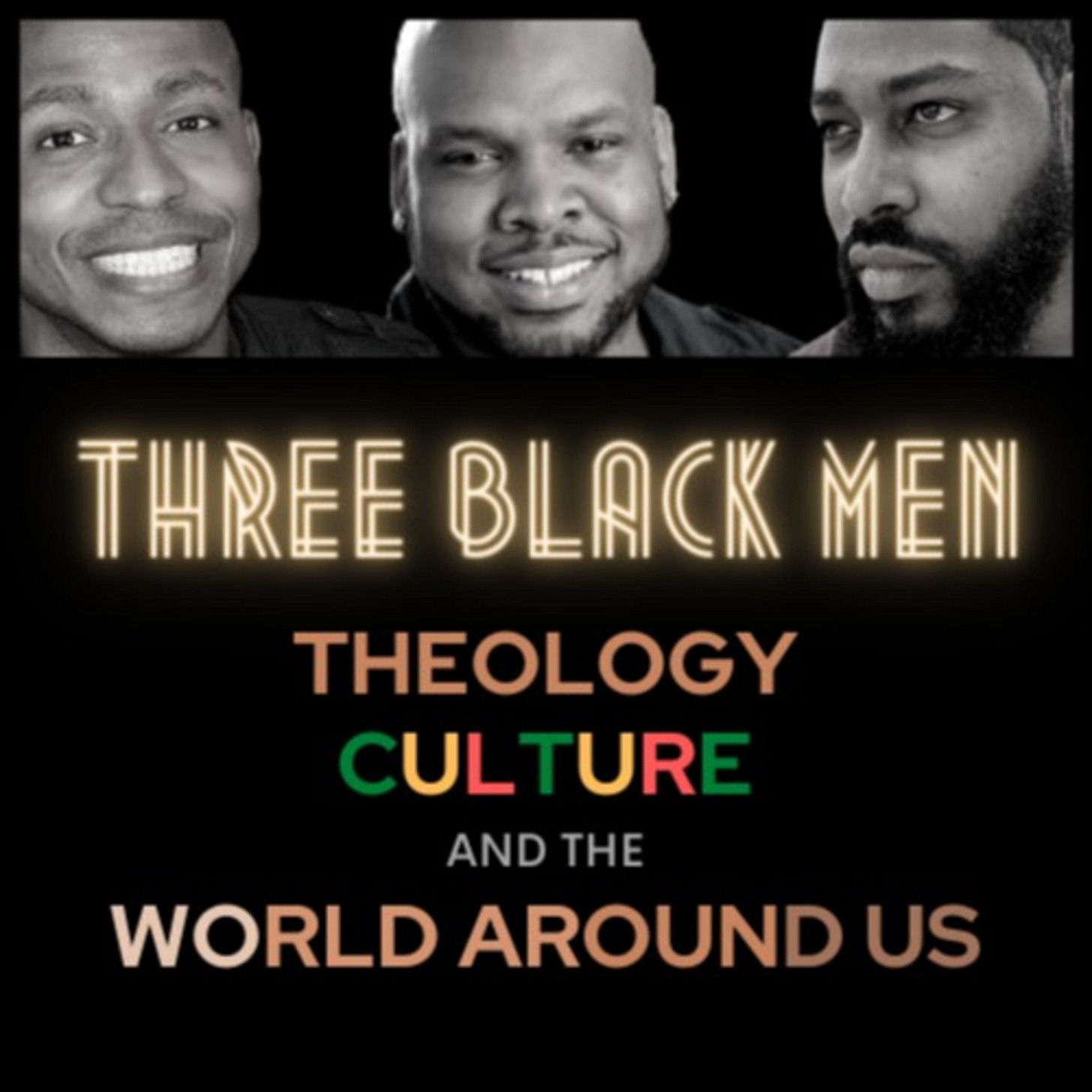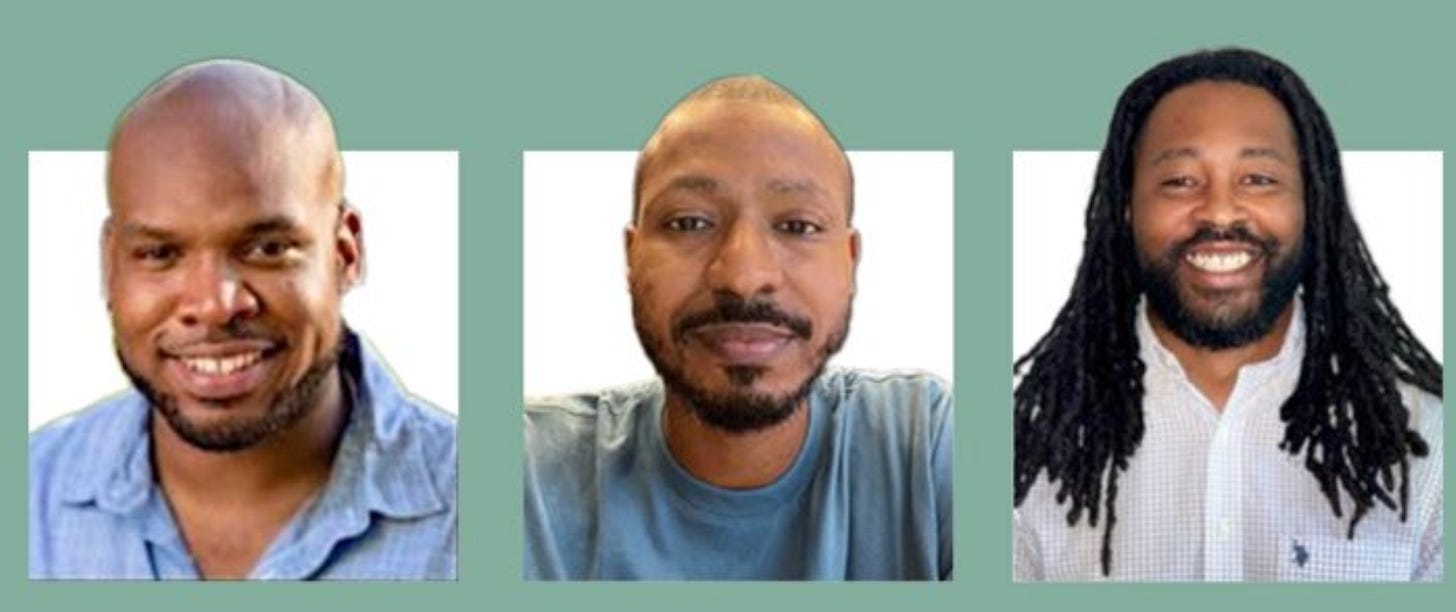Three Black Men and God
A Conversation with Trey Ferguson, Samuel Gay, and Robert Monson
In Good Faith host Steven Kapp Perry recently spoke with fellow podcasters Trey Ferguson, Samuel Gay, and Robert Monson from Three Black Men. They are theologians and thinkers, each with a unique charisma and sense of humor evident in this interview. Their discussion includes individual stories of finding God and developing a concrete understanding of God’s love.
Steve: I wonder if you could each tell me how you knew about God. When did you know there was such a thing as a higher power, a God to believe in?
Rob: Well, I grew up as an atheist, and so my presupposition was that there is no God.
I always love to tell people that I grew up as a black atheist—not just an atheist, but a black one. My social location informed what I believed about a higher power. When I surveyed the landscape of Chicago—the racial inequalities there, the way that black people were brutalized—it was obvious to me that there is no God.
I came to faith later in life. I had this ever burgeoning curiosity about, How did we get here? and Who gets to dictate how we interact with one another? My conversion story is a long one. There was a real experience in college that led me to believe in God.
Sam: For me, I was raised in church. But when I look back through my childhood, adolescence, through my teenage years, my twenties and early thirties, I literally see the hand of God holding me. That right there is enough for me to believe through whatever theological questions I have.
I don't recall an exact moment, but that’s where I find rest, that’s where I find peace. Now I'm confident in believing that God is real.
Trey: Like, Sam, I grew up in church. My mother loves telling the story of how I was born on a Wednesday and in church that Sunday.
My story is a little bit like that of Jacob in the Bible. Abraham has a relationship with God, and then Isaac inherits this relationship with this God, and then Jacob is born and lives a life with some mischievous activities going on.
There's one point in the story of Genesis where Jacob has a conversation. He says, “Look if you will do this for me, if this is how our relationship goes, then you will be my God.” It's not until Jacob makes an actual decision that he comes to know God as the God of Abraham, Isaac, and Jacob.
That's a revelation that I had for myself in young adulthood. Eventually, I was like, this is no longer just the faith that my mother and my father handed down to me. This is my own faith, and it's one that I am constantly learning and growing in, and learning new things about God.
Steve: What do you understand differently about God now than you did five, ten years ago?
Rob: I profoundly think that God is more loving than we give God credit for. That's the confession in which I first believed, but two decades later, I think that God is way more loving, way more persevering, and way more willing to go to the depths than we give God credit for.
Trey: I think in that same vein, I didn't truly understand that God's love for me don't have nothing to do with me until I got older. It's not because of anything that I've done.
Regardless of where you find somebody, regardless of where they are politically, regardless of what their gender expression is or their sexual orientation—none of that has anything to do with God's love for them.
Sam: His love is vastly deeper and wider than I ever could imagine. I think we use the word love so much. We use it so flippantly: “Oh, I love ice cream.” Do you really love ice cream? Or do you just like it a lot? That's a strong word. This affects the way we talk about God when we say that we love him. It affects the way we understand love.
I don't know that there is a shallow portion to love. I think love is just deep and wide; love is meant to cover. Love is meant to encompass all. And that's the way I see God.
Steve: When you felt that God really loved you, and you were worthy of love, did you love God more because of that?
Trey: I think I did love God more because of that, but more importantly, I loved other people more because of that. You notice, if you listen to the podcast, I use the word Beloved a lot. It's in the intro and everything.
Even as I'm disagreeing, when I'm battling trolls online, I often be like, “Hey, Beloved”. Because even as I'm chastising something you're saying, I need to affirm your identity that you are beloved of God; God loves you.
Sam: I think it taught me what love truly was, so I could actually love God and actually love people. There was this affirming and confirming presence that just made me feel comfortable and at peace with who I am.
Steve: I love what you brought up, that once you recognize that for yourself, you say, well, he feels the same about this person next to me—that's the gospel.
I'm wondering, for your faith or your relationship with God, how has child rearing affected that?
Trey: I have three children in different stages, my youngest will be nine next month.
My oldest is going through a place where she is questioning the veracity of some biblical stories and some faith claims. Originally, I think there was some fear, particularly me being in vocational ministry, but this is what I do. I deal with the questions.
If you are harboring doubts, let me know. I'm not here to judge those doubts. I'm not even here to erase those doubts. I'm here to affirm the fact that God gave you a rational mind so that you can work through these things.
You don't need to feel as though you're deficient, or that you're somehow doing something wrong because you have these questions. I believe God gives you those questions because as you begin to wrestle, you begin to pursue paths that actually help lead somebody else closer to wholeness.
Sam: I try to be a safety net for my kids, as opposed to a staunch disciplinarian.
I never want my kids to feel like they're in the way. I want them to know it's okay to take up space. I want them to know what agency is and to practice that. Granted, I still have two that are toddlers, and agency with them is difficult. No, you can't surf on the rocking chair, that's not safe. But, in being a safety net, I have a plan to help them get up.
Steve: Sam, you said something I thought was really important in conjunction with raising your kids: you want them to have a voice. On this podcast, your voices are heard. Does this tie in with the beginning of Black Lives Matter, George Floyd, and some of those really horrific events? Did that have any influence on you wanting to be able to speak?
Sam: I think we have enough life experience that we could have done this—period. Just from listening to the stories of my two co-hosts, there's enough trauma. There's enough life experience for us to have this podcast without stepping in and talking about George Floyd—and we should—but we also have our own experiences of being followed. We have our own experiences of racial discrimination from elementary school.
Trey: I don't think that George Floyd, and Ahmaud Arbery, and Breonna Taylor impacted the way that we approached this; I think it impacted the way that white people listened.
What that did was bring to crystal, high-definition clarity the reality that their perspectives and the content they consumed were very limited. Some people sought out black voices, and we happen to be some of the black voices that people listen to.
Listen to the Full Episode
Hear more from Trey, Sam, and Rob on their podcast, Three Black Men. Their remarks will also be on an upcoming In Good Faith mini-series on God’s Love, airing March 17.
The In Good Faith podcast aims to build bridges of understanding between religions. In talking with believers of different faiths, In Good Faith highlights personal experience and commonalities across spiritual traditions.






